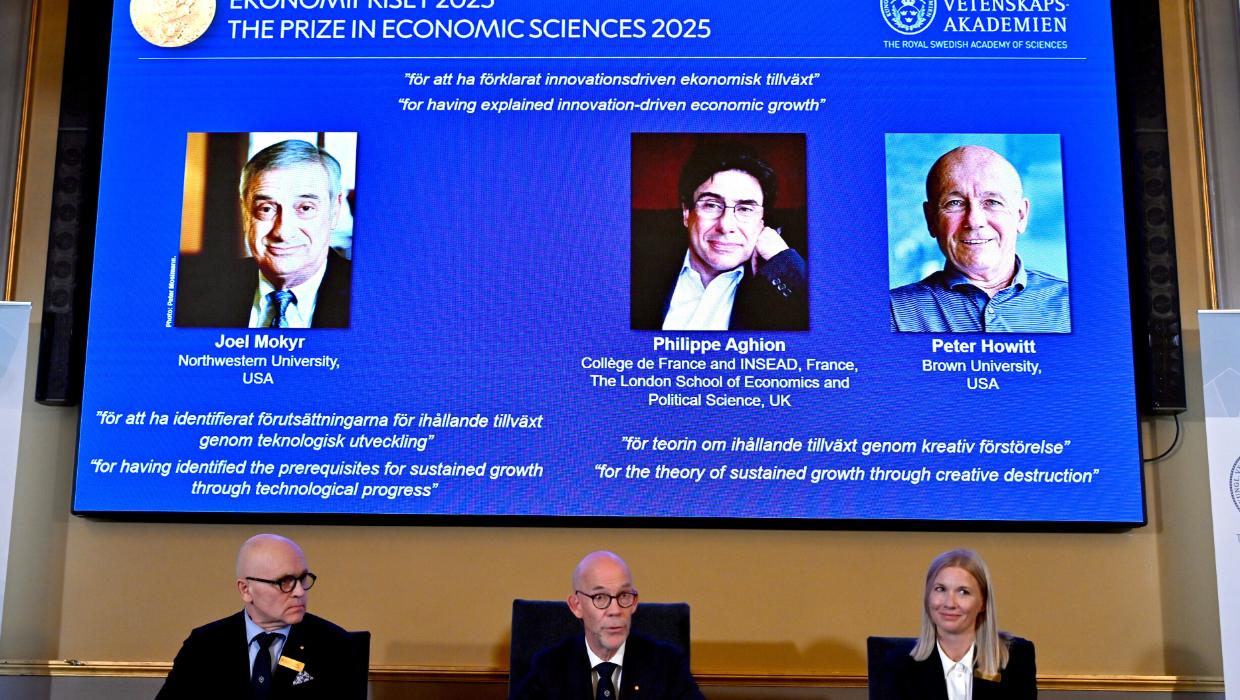Science
Economists Awarded Nobel for Insights on Creative Destruction

On October 9, 2023, three distinguished economists were awarded the Nobel Memorial Prize in Economic Sciences for their groundbreaking research on the phenomenon of creative destruction. Their work sheds light on how innovation drives economic growth and enhances human welfare, even as it sidelines older businesses. The laureates, Joel Mokyr, Philippe Aghion, and Peter Howitt, were recognized for their contributions to understanding the mechanisms behind this crucial economic process.
Examining Creative Destruction
The term “creative destruction,” originally coined by economist Joseph Schumpeter in his 1942 work, describes how new technologies and ideas disrupt established markets. The Nobel committee highlighted that Mokyr has effectively demonstrated the need for not only recognizing successful innovations but also understanding the underlying scientific principles that drive them. Aghion and Howitt further expanded this concept by developing complex mathematical models that articulate the dynamics of sustained economic growth and innovation.
Examples of creative destruction abound in modern society. The rise of e-commerce has disrupted traditional retail, while streaming services have largely replaced video rental businesses. Historical parallels, such as the decline of horse-drawn wagons due to the advent of the automobile, emphasize the perpetual cycle of innovation that characterizes economic development.
John Hassler, chair of the Nobel committee for economic sciences, stated, “The laureates’ work shows that economic growth cannot be taken for granted.” He emphasized the importance of nurturing the mechanisms that promote creative destruction to avoid stagnation.
The Role of Innovation in Economic Growth
Aghion and Howitt’s research also indicates that monopolistic markets can stifle innovation. This concern is particularly relevant in industries such as telecommunications and social media, where a few dominant companies exert significant influence. Their findings advocate for policies that support those adversely affected by technological changes, emphasizing the need for social mobility over job preservation.
Mokyr, who has long remained optimistic about the potential of technological advancement, counters the view that recent innovations lack economic impact. He suggests that while many modern services may appear inexpensive or free, their benefits are substantial yet often underreported in economic data. For instance, he cited the transformative effect of Spotify, which has revolutionized music access.
At the press conference following the award announcement, Mokyr expressed that the perception of artificial intelligence as a threat to human jobs is largely exaggerated. He described AI as a “magnificent research assistant” capable of enhancing productivity rather than replacing human workers. He noted, “They move us to more interesting, more challenging work.”
The Nobel Prize, valued at 11 million Swedish kronor (approximately $2.02 million), is split between Mokyr and his co-recipients, Aghion and Howitt. Each laureate also receives an 18-carat gold medal and a diploma. The award is formally known as the Bank of Sweden Prize in Economic Sciences in Memory of Alfred Nobel and has been awarded since 1968.
Mokyr, who will celebrate his 80th birthday next summer, shared that the news of his award came as a surprise while he was checking his email early in the morning. “I think I sat there for 15 minutes, sort of dazed,” he remarked. Similarly, Howitt thought he was the victim of a prank when informed of his win, while Aghion found himself tasked with sharing contact information for his fellow laureates with the Nobel committee.
As Europe grapples with its innovation landscape, Aghion emphasized the urgency of fostering research and venture capital to remain competitive with the United States and China. “We have to wake up,” he warned, underscoring that success in the global economy will hinge on the ability to innovate.
The insights provided by these economists underscore a vital narrative in the discourse on economic growth and innovation. Their work not only highlights the necessity of adapting to change but also the importance of supporting those in transition, ensuring that society benefits from the advancements driven by creative destruction.
-

 World4 months ago
World4 months agoTest Your Knowledge: Take the Herald’s Afternoon Quiz Today
-

 Sports4 months ago
Sports4 months agoPM Faces Backlash from Fans During Netball Trophy Ceremony
-

 Lifestyle4 months ago
Lifestyle4 months agoDunedin Designers Win Top Award at Hokonui Fashion Event
-

 Entertainment4 months ago
Entertainment4 months agoExperience the Excitement of ‘Chief of War’ in Oʻahu
-

 Sports4 months ago
Sports4 months agoLiam Lawson Launches New Era for Racing Bulls with Strong Start
-

 World5 months ago
World5 months agoCoalition Forms to Preserve Māori Wards in Hawke’s Bay
-

 Health4 months ago
Health4 months agoWalking Faster Offers Major Health Benefits for Older Adults
-

 Lifestyle4 months ago
Lifestyle4 months agoDisney Fan Reveals Dress Code Tips for Park Visitors
-

 Politics4 months ago
Politics4 months agoScots Rally with Humor and Music to Protest Trump’s Visit
-

 Top Stories5 months ago
Top Stories5 months agoUK and India Finalize Trade Deal to Boost Economic Ties
-

 Health2 months ago
Health2 months agoRadio Host Jay-Jay Feeney’s Partner Secures Visa to Stay in NZ
-

 World5 months ago
World5 months agoHuntly Begins Water Pipe Flushing to Resolve Brown Water Issue









